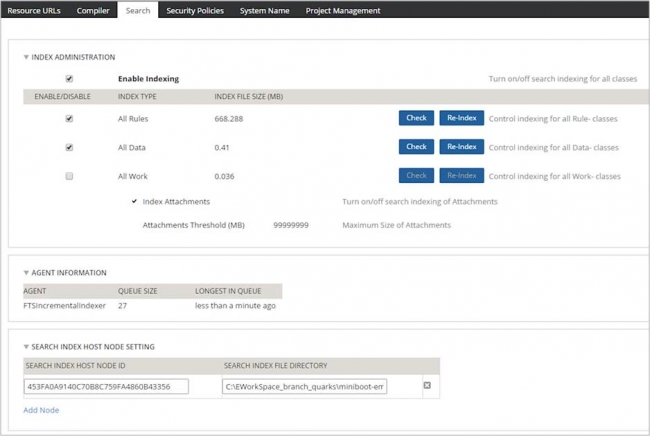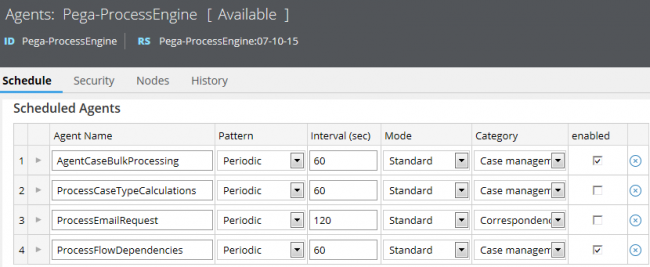Additional upgrade scripts for new columns
Valid from Pega Version 7.1.4
In Version 6.2, additional columns (Major, Minor, and Patch) containing ruleset Version information were added to 15 tables in the PRPC database. When upgrading from a pre-Pega 7 release, scripts must be manually run after the upgrade to populate these columns.
These scripts are located in the Resource Kit, under Additional Upgrade Scripts.
- If upgrading to a single schema, run both scripts.
- If upgrading to a split schema, run the _data script against the data schema and run the _rules script against the rules schema.
Choose the scripts for your database type:
- db2zos_rulesetversion_columns_data.sql
- db2zos_rulesetversion_columns_rules.sql
- mssql_rulesetversion_columns_data.sql
- mssql_rulesetversion_columns_rules.sql
- oracle_rulesetversion_columns_data.sql
- oracle_rulesetversion_columns_rules.sql
- postgres_rulesetversion_columns_data.sql
- postgres_rulesetversion_columns_rules.sql
- udb_rulesetversion_columns_data.sql
- udb_rulesetversion_columns_rules.sql
Database
Valid from Pega Version 7.1.4
Improvements to data handling were made for search indexing, agent processing, and filtering. Scripts were provided for proper population of the database tables.
- Importing data from shared obj-external tables is now supported.
- A validation warning will now display when an unexposed property is used in filter or join conditions.
- A Global Search index may now be created across two databases.
- Agent processing on multiple nodes has been improved.
- Improvements were made to controls in Report Definition pages which are used in a dynamic grid.
- Filtering functionality involving special characters has been enhanced.
- Scripts have been provided to populate the RuleSetVersion Major, Minor, and Patch columns.
System Management
Valid from Pega Version 7.1.4
Refinements were made to out-of-place upgrade documentation and processes, as well as for how handling is performed for all of the database vendor specific nuances related to a deploying into a split schema environment.
- A script was created to run the data schema upgrade for z/OS systems.
- In a split-schema configuration, indexing has been enhanced.
- The product installer has been enhanced.
- The stand-alone Static Assembly Utility does not require a password for its process.
- The UpdateManager tool has been improved.
Adaptive Decision Manager installation changes to support delayed learning
Valid from Pega Version 7.1.7
To support delayed adaptive learning, Adaptive Decision Manager (ADM) has been enhanced with database schema changes and no longer relies on Hibernate. This change has an impact in the way ADM is set up in the Decision Management service layer: the jdbc/admDataSource resource is now superseded by jdbc/adm7DataSource.
Additionally, Pega 7.1.7 further simplifies the ADM deployment by providing a single enterprise application or web archive:
- Single EAR deployment archive that can used when deploying ADM on IBM WebSphere and Oracle WebLogic
- Single WAR deployment archive that can be used when deploying ADM on Tomcat and JBoss
Improved full text search
Valid from Pega Version 7.1.7
In Pega 7.1.7, Elasticsearch is used to provide full-text search functionality for rules, work, and data content, replacing the existing Lucene search functionality. In addition to providing search results two to five times more quickly than with Lucene Search, Elasticsearch is more scalable: with multi-threaded bulk and incremental indexing, it provides enhanced information about the search queue, the ability to host index files on multiple nodes, a more robust and expressive search parser, the ability to configure thresholds for alerts and search query time-outs, and automatic handling of replication and failover.

The search management user interface, where you can see length of queue and age of entries, which node hosts the search index, and where it is located.
After upgrading to Pega 7.1.7, the system administrator must manually migrate search functionality from Lucene Search to Elasticsearch. Note that during the switch-over and until the indexes are rebuilt, Lucene search continues to function and there is no interruption in search functions. For more information, see the Pega 7.1.7 Upgrade Guide.
Use JDBC 4 compliant drivers for better performance
Valid from Pega Version 7.1.7
For better performance, ensure that you are using JDBC 4-compliant drivers. For more information on supported and non-supported JDBC drivers, please reference the Platform Support Guide.
Use Tomcat 7 for better performance
Valid from Pega Version 7.1.7
For better performance with a Tomcat web server, use Tomcat 7.
Tomcat 6 has a limitation that causes the server to treat the JDBC driver as if it were a JDBC 3-compliant driver, even if the system is using a JDBC 4-compliant driver. Customers using Tomcat will see better performance if they upgrade to Tomcat 7 and use a JDBC 4-compliant driver.
Engine will not start if the incorrect JDBC driver is used
Valid from Pega Version 7.1.7
The engine will not start up if the incorrect JDBC driver is used. The following configurations are unsupported:
- Using a Multi-tenant Oracle system with one of the Oracle JDBC drivers with issues (see the chart in the Platform Support Guide)
- Using a Multi-tenant system with a JDBC 3 compliant driver, OR with Tomcat 6 (for more information on using tomcat with Pega 7.1.7, see Use Tomcat 7 for best performance)
- Using Microsoft SQL Server with a JDBC 3 compliant driver, OR with Tomcat 6 (for more information on using tomcat with Pega 7.1.7, see Use Tomcat 7 for best performance)
When any of these unsupported configurations are encountered, Pega 7 will not start. Before this change, the engine would appear to start up properly, but would encounter issues during other parts of the engine startup or during actual use of the system.
View agent activity and status more efficiently
Valid from Pega Version 7.1.7
The menu has been updated with several additional tabs detailing system information pertinent to an active server node running on a system, along with its requestors, log utilities, and purge/archive utilities. The link to the System Management Application tool has also been moved to the menu in this release.
Previously, to understand your system, you had to access every node on your system individually. With this update, the information available on these tabs allows you to view all agents across a cluster to determine if an agent is active and in-depth details about the agent in a more efficient manner.

The System: Operations page displays agent information and status on a system
Access this menu by selecting . For more information, see the System Operations landing page.
Changes to default Agent settings
Valid from Pega Version 7.1.7
Default agent settings across several rulesets have been updated in this release. Changes to settings include agents that are now:
- Disabled by default
- Scheduled to run at a recurring designated time interval (in seconds)
- Scheduled to run daily at a specified time

An example of some updated default agent settings. Compared to earlier versions, you can see in Pega 7.1.7 that ProcessCaseTypeCalculations and ProcessFlowDependencies are now set to run every 60 seconds, and that ProcessEmailRequest is disabled.
This update allows operations staff to understand the general purpose of an agent by product, and enhances usability of this information by improving navigation of agents in large systems through filtering and sorting.
For more information, see Changes to default agent settings in Pega 7.1.7.

